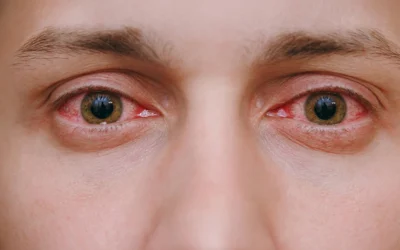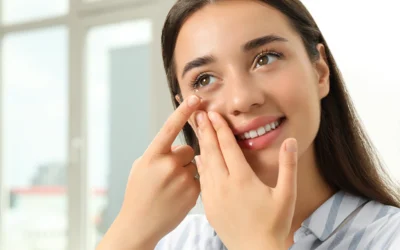Spring is a beautiful season with lots of flowers and vibrant greens, but it can be hard to enjoy when you have allergies. So why does springtime leave so many of us with itchy, red, and puffy eyes? How can we be sure it’s allergies and not something else, and what can we do to keep our eyes feeling good so we can enjoy the season?
Learn all about the causes of seasonal allergies, prevention tips, and when you should see our optometrist in Tinley Park.
What causes allergies?
Allergies can be caused by all kinds of things, from pet dander to dust to perfume, so they aren’t necessarily limited to a particular time of the year. However, they do tend to get worse in the spring and the fall, and that’s because of pollen.
Some plants, like grass, pollinate in the spring, while others, like ragweed, pollinate in the fall. During this time, the air becomes full of these tiny particles that we can breathe in or get in our eyes without realizing it. When that happens to someone with an overactive immune system, it leads to congestion, itchy eyes, and plenty of sneezing.
How do allergies affect your eyes?
Typically, eye-related allergy symptoms will include watering, redness, and itchiness. There may also be a scratchy or gritty feeling, a burning sensation, swollen eyelids, and some discomfort wearing contact lenses.
It might seem that taking decongestants will help. However, they can worsen eye symptoms by drying out the eyes, making them even more vulnerable to airborne allergens.
Tips for soothing allergy symptoms
It’s very important to stay well hydrated during an allergy attack, and there are a few steps you can take to protect your eyes:
-
Use eye drops to help with irritation, especially if you’re taking allergy medication that can dry out your eyes.
-
Stick to glasses instead of contacts, which can trap allergens against the eye and worsen symptoms.
-
Avoid rubbing your eyes, no matter how itchy they feel.
How to prevent allergies
It’s not possible to avoid all pollen in the air, but you can take steps to minimize exposure:
-
Keep windows shut and avoid using window fans that can blow pollen indoors.
-
Stay inside on windy days when pollen levels are higher.
-
Wear a pollen mask while doing yard work or outdoor chores.
-
Protect your eyes with sunglasses or regular glasses to reduce direct contact with pollen.
Is it dry eye or allergies?
Sometimes it’s hard to tell whether your eyes are acting up because of allergies or dry eye—they can feel pretty similar! Here are some ways to tell the difference:
Allergies
-
Your eyes might be itchy, watery, or puffy.
-
Symptoms often show up suddenly or seasonally.
-
You might also notice sneezing, a runny nose, or other allergy signs.
Dry eye
-
Symptoms include burning, stinging, or a feeling of something in the eye.
-
Eyes may feel irritated all the time, not just during allergy season.
-
Vision may fluctuate, and contact lenses can feel uncomfortable.
If you’re unsure whether your symptoms are due to allergies or dry eye, scheduling an eye exam in Tinley Park is the best way to get a clear answer. Our eye doctor can evaluate your eyes and recommend treatments like lubricating drops, allergy relief options, or other solutions to keep your eyes comfortable all year.
Count on your optometrist
Whether you’re having eye trouble because of allergies or any other reason, Walter Eye Clinic is here to help. We want all of our patients to be able to enjoy the spring season, so give us a call if you’ve been dealing with itchy, watery eyes. We wish you all a wonderful spring!



